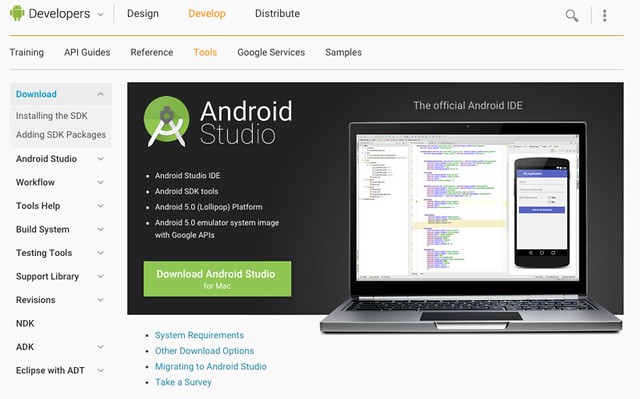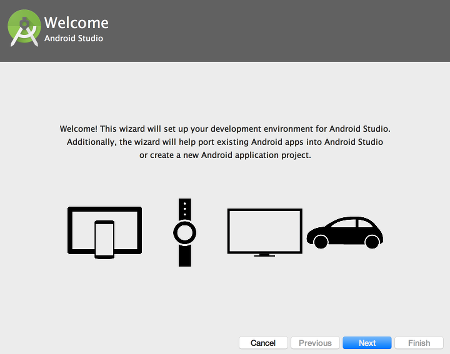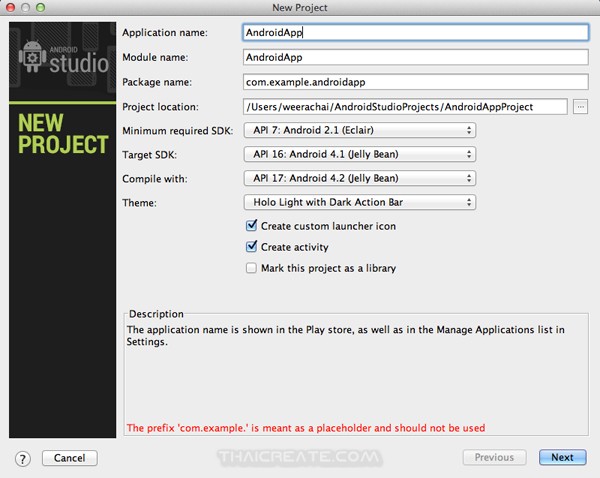

- Android studio for mac how to#
- Android studio for mac mac os#
- Android studio for mac zip file#
- Android studio for mac android#
- Android studio for mac download#
Android studio for mac zip file#
Android studio for mac download#
Go to the android SDK command-line tools download page and download the related zip files.If you do not need Android Studio, and you just want to use android SDK command-line tools only, it is very easy also.
Android studio for mac how to#
How To Download And Install Android SDK Command Line Tool Manually. Now open a terminal and run adb, you should also see something output like in windows.Make the added system environment take effect.

export ANDROID_HOME=/Users/Jerry/Library/Android/sdkĮxport PATH=$PATH:$ANDROID_HOME/tools/binĮxport PATH=$PATH/:$ANDROID_HOME/platform-tools

You can also see the hidden Library folder by opening a macOS Finder window, then click Go -> Go to Folder… menu item, and input ~/Library in the popup dialog input text box, then click Go button.
Android studio for mac mac os#
finder AppleShowAllFiles TRUE in a macOS terminal window ( please read article How To Show Hidden Files In Mac OS Finder And Select Hidden Files In Html Upload File Form ). If you can not find the above folder in macOS finder or terminal, this is because the Library folder is a hidden folder by default, you should make the hidden folder visible by executing the command $ defaults write com.Generally, the Android SDK is installed in the /Users/user-name/Library/Android/sdk folder on macOS.It will focus on the Android SDK menu item on the left side, and you can get the Android SDK Location directory path value on the right side Android SDK Location text box.Input search keyword sdk in the search box of the popup Preferences dialog window left side.Open Android Studio on macOS, then click Android Studio -> Preferences menu item at the left top toolbar.Installed as C:\Users\Administrator\AppData\Local\Android\Sdk\platform-tools\adb If you see output like below that means the android SDK path variable has been configured successfully. Click OK to close the system environment variables settings window, open a dos window, type command adb in it.Please note the must be English character otherwise, it will not take effect. Select variable Path and click Edit button and add %ANDROID_HOME%\tools %ANDROID_HOME%\tools\bin %ANDROID_HOME%\platform-tools at the end of its value.Click the New… button to add a new system variable, input ANDROID_HOME as the variable name, and input the Android SDK location directory path ( such as C:\Users\Administrator\AppData\Local\Android\Sdk ) as the variable value.Click the Advanced system settings link on the left panel, it will popup the System Properties window, click the Environment Variables button to open the Environment Variables window.This will open the windows system configuration window. Right-click the computer icon in Windows file explorer left side, click Properties menu item in the popup menu list.Then you can find the Android SDK Location directory path on the right side ( in this example, the Android SDK location path is C:\Users\Jerry\AppData\Local\Android\Sdk ), remember it.ġ.2 Set %ANDROID_HOME% and %Path% System Environment Variable. Expand Appearance & Behavior -> System Settings -> Android SDK menu item on the left side of the popup window.Open android studio, click File -> Settings menu item in the top menu bar.Before you can configure it, you should first get the android SDK install directory following the steps below.1.1 Get Android SDK Install Directory Path. Configure Android SDK Variable In Windows. 1.2 Set %ANDROID_HOME% and %Path% System Environment Variable.1.1 Get Android SDK Install Directory Path.


 0 kommentar(er)
0 kommentar(er)
